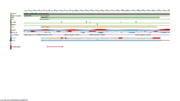User:Ophelie Lefort/Sandbox
From Proteopedia
(Difference between revisions)
| Line 6: | Line 6: | ||
== Function == | == Function == | ||
PRSS57 are granule-associated enzymes which have a function in the intracellular action against microorganisms in neutrophil cells. These enzymes is the primary reason of damages in the tissue of inflammation’s sites. | PRSS57 are granule-associated enzymes which have a function in the intracellular action against microorganisms in neutrophil cells. These enzymes is the primary reason of damages in the tissue of inflammation’s sites. | ||
| - | Indeed, neutrophils are rapidly recruited to the site of inflammation. Microorganisms are engulfed by the neutrophils and sequestered in the phagolysosome. This sequestration induces the fusion of neutrophil granules with the phagolysosome and the release of proteases into the phagolysosome. PRSS57 are released | + | |
| + | Indeed, neutrophils are rapidly recruited to the site of inflammation. Microorganisms are engulfed by the neutrophils and sequestered in the phagolysosome. This sequestration induces the fusion of neutrophil granules with the phagolysosome and the release of proteases into the phagolysosome to kill the bacteria. PRSS57 are released into specific granules, the azurophilic granules. Recent studies also show that this serine protease regulate the inflammatory response by proteolytically modifying chemokines and, activating or inactivaing cytokines. This leads to enhancement or abolishment of the function of these immune mediators. This neutrophil serine protease could also control the release of chemokines from neutrophils. In addition, the caspase-like activity of PRSS57 can activate lymphocytes and the adaptive immune response. | ||
Revision as of 12:45, 26 January 2017
|
| |||||||||||
References
- ↑ Hanson, R. M., Prilusky, J., Renjian, Z., Nakane, T. and Sussman, J. L. (2013), JSmol and the Next-Generation Web-Based Representation of 3D Molecular Structure as Applied to Proteopedia. Isr. J. Chem., 53:207-216. doi:http://dx.doi.org/10.1002/ijch.201300024
- ↑ Herraez A. Biomolecules in the computer: Jmol to the rescue. Biochem Mol Biol Educ. 2006 Jul;34(4):255-61. doi: 10.1002/bmb.2006.494034042644. PMID:21638687 doi:10.1002/bmb.2006.494034042644
- ↑ S.. Jack Lin, Ken C. Dong, Charles Eigenbrot, Menno van Lookeren Campagne, Daniel Kirchhofer Structures of Neutrophil Serine Protease 4 Reveal an Unusual Mechanism of Substrate Recognition by a Trypsin-Fold Protease DOI: http://dx.doi.org/10.1016/j.str.2014.07.008
- ↑ Natascha C. Perera, Karl-Heinz Wiesmüller, Maria Torp Larsen, Beate Schacher, Peter Eickholz, Niels Borregaard and Dieter E. Jenne NSP4 Is Stored in Azurophil Granules and Released by Activated Neutrophils as Active Endoprotease with Restricted Specificity DOI: https://doi.org/10.4049/jimmunol.1301293

